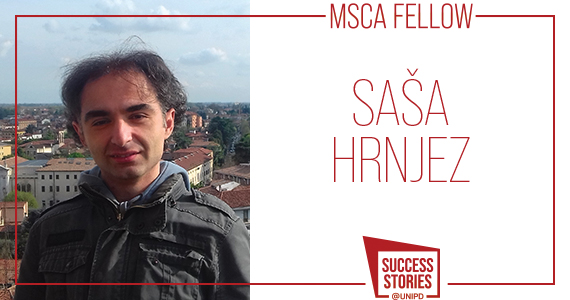
MSCA Fellow: Saša Hrnjez
Have you ever thought about how a translation can be affected by political and cultural contexts?
Saša is a Ph.D in theoretical philosophy and through his research he is trying to give an answer to the question of how translation can be seen as the common language in dynamic plurlilingual spaces such as the European.

Saša Hrnjez is a Ph.D in theoretical philosophy from the University of Turin (2015). In previous years he was a research fellow at the Italian Institute for Philosophical Studies in Naples and a DAAD post-doc research fellow at the Heidelberg University. He studied philosophy at the University of Novi Sad (Serbia), University of Turin (Italy), with short study and research stays at the Freie University Berlin. So far, he has published articles in Italian, English, Serbian and German in his main research fields.
In 2018 he has been awarded a MSCA European Fellowship “Toward a Philosophical Rethinking of Translation: Effects of Translation in a Contemporary European Space “.
Can you shortly explain your project? Which are the objectives of your research?
In my project, entitled “Toward a Philosophical Rethinking of Translation: Effects of Translation in a Contemporary European Space” (TRANSPHILEUR) at the Department of Philosophy (FISPPA), I investigate a conception of translation as a self-reflexive transformational practice. The main idea is to bring new impulses and directions into contemporary translation theory through a philosophical interpretation, employing a “dialectical” approach to the question of translation, and taking into consideration its political and cultural aspects.
Why did you choose to apply for a MSCA-IF? What do you think a MSCA-IF could represent in the career of a researcher?
MSCA-IF for me was the best: a unique opportunity to take a new and decisive step in my precarious post-doc period and to initiate a new project, a new phase in my professional development. MSCA give everybody a great chance to work under wonderful conditions and to achieve a certain independence. That is quite rare in today’s academy.
Why did you choose to apply with University of Padua as Host Institution? Would you suggest it?
I would definitely suggest the University of Padua as a flourishing international research environment with a competent research staff. My choice of Unipd was mostly determined by the choice of the Department of Philosophy and by my previous contacts with the supervisor and other researchers.
Unipd offices offer an experienced and friendly support for a researcher. When I have a doubt or need advice, I know where to go.
What would you suggest to a researcher that is planning to apply for a MSCA-IF?
Don’t be afraid of the high competition and the challenging statistics - just try! One suggestion would be to take a MSCA-IF application as a training experience in order to learn more about project writing in general and, regardless the results, to build up competences that can certainly help in other future projects.
International Research Office
via Martiri della libertà 8, 35137 Padova, Italy
tel. +39 049.827 1947 / 1948 / 1945
fax +39 049.827 1911
international.research@unipd.it


